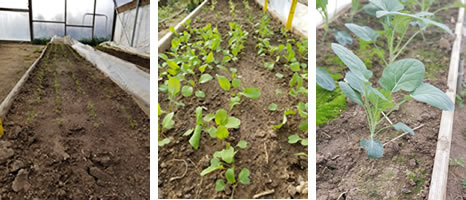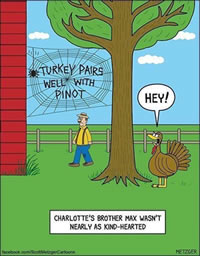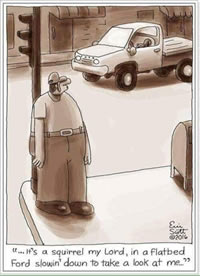Address any questions or comments regarding this newsletter to the individual authors listed after each article or to its editors, Nathan Johanning, 618-939-3434, njohann@illinois.edu or Bronwyn Aly 618-695-6060, baly@illinois.edu. The Illinois Fruit and Vegetable News is available on the web at: http://ipm.illinois.edu/ifvn/. To receive or be removed from email notification of new postings of this newsletter, contact Nathan Johanning or Bronwyn Aly at the phone numbers or email addresses above.
In This Issue:
Upcoming Programs (listings for beginning and established growers)
News & Announcements (Seeking Entries for the 2019 Sweet & Hard Cider Contests)
Regional Reports (southern Illinois, Dixon Springs)
Fruit & Vegetable Production & Pest Management (Balancing Pest and Pollinator Management)
Upcoming Programs
Check the Illinois SARE calendar for a full list of programs and links for registration. http://illinoissare.org/ and http://illinoissare.org/calendar.php Also see the University of Illinois Extension Local Food Systems and Small Farms Team’s website at: http://web.extension.illinois.edu/smallfarm/ and the calendar of events at http://web.extension.illinois.edu/units/calendar.cfm?UnitID=629.
- Writing a Farm Food Safety Plan, November 29, 2018 2:00 - 5:30 p.m. 1615 Commerce Pkwy, Bloomington, IL. In this workshop, we will provide you with a template for crafting a food safety plan for your farm, walk you through the process of developing your plan, and provide you with access to experts to answer your food safety questions. Learn more and register online: https://thelandconnection.org/foodsafety2019 or contact Laurie George at 618-548-1446 ljgeorge@illinois.edu.
- Great Lakes EXPO, December 4-6, 2018, DeVos Place Convention Center, Grand Rapids, MI. This conference cover, fruit, vegetable and farm markets along with the Michigan Greenhouse Growers Expo. To register or for more details visit, www.glexpo.com
- 2019 Illinois Specialty Crops Agritourism & Organics Conference, Wednesday-Friday, January 9-11, 2019. Crowne Plaza, Springfield, IL. Save the date! Conference registration found at https://form.jotform.com/WebServ/2019-ISA-conf-reg
- 2019 Southwestern Illinois Tree Fruit School, Thursday, February 7, 2019, Knights of Columbus Hall, Hardin, IL. Save the date; more details to follow!
- 2019 Southern Illinois Fruit & Vegetable School, Friday, February 8, 2019, Doubletree (formerly Holiday Inn) Mt. Vernon, IL. NOTE: this program represents the merging of the Gateway Small Fruit and Vegetable School and the Southern Illinois Tree Fruit School covering, tree fruit, small fruit & vegetables. Save the date; more details to follow!
News & Announcements
Seeking Entries for the 2019 Sweet & Hard Cider Contests
Cider making is starting, so make sure to pull some samples to submit for the 2019 Sweet and Hard Cider Contests! The 30th annual Sweet Apple Cider Contest and 17th annual Hard Cider Contest will take place on Thursday, January 9 in conjunction with the Illinois Specialty Crops, Agritourism, and Organic Conference. For the Apple Cider Contest, contestants are asked to submit a one-gallon full container of unclarified apple cider that may be fresh or have been stored frozen. Hard apple cider contestants are asked to submit a one-quart, but no more than a one-gallon, container of product for the hard apple cider-judging contest.
Ken Johnson (217-243-7424; kjohnso@illinois.edu)
Kelly Estes, State Survey Coordinator, Illinois Cooperative Agricultural Pest Survey (217-333-1005; kcook8@illinois.edu)
Regional Reports
From southern Illinois… November has continues the trend for colder than normal temperatures. We have had a few mornings down to 18-20˚. Highs have varied but not much higher than 40s and 50s and a few days only got into the 30s. Last Wednesday night into Thursday we had our first snow of the year. Most of southern Illinois received from 2-6”inches of snow. It did not hang around long as we had temperatures in the 40s and 50s in the days after that. Beyond that we have been wet with the week prior getting 2-3 inches of rain across a few days. Looking ahead I think the weather is supposed to be nicer for the upcoming thanksgiving week.
Field work has slowed quite a bit with the cold and wet. Just in the last week we planted what will be probably the last of some cover crops. We both broadcast and no-till drilled cereal rye. Especially for the broadcast rye the snow was probably just right to get it some moist conditions. Now if we get some warm weather this upcoming week it should sprout and get established. Often later planted cereal rye will not look like much at all until spring. Even if you don’t see much above the ground there are often many roots growing holding and protecting the soil through the winter.
Despite the cold our cool-season, high tunnel crops are still doing well. Below are some high tunnel observations for the high tunnel at the Jackson County Extension Office by Program Coordinator, Maggie Ray:
In the high tunnel, we will be pulling the last of our peppers out. They did not survive the lows of Friday, November 9th which were in the low 20s. The row covers were brought out Friday afternoon to cover our smaller fall plantings and winter greens. The arugula, lettuce, spinach, carrots, and broccoli are doing great! There is still parsley in the bed from this summer and it is thriving as well. The early planted carrots (Oct.8th) all have at least one or two true leaves and I have had to go through and thin them. The late planted carrots (Oct.29th) are just starting to come up, very slowly now.
The arugula was growing very steadily and I would have harvested in a week but now I think it might be a little longer with night time temps being so cold and the cloudy weather.
This week (11/11-11/17) because of the cold daily temperatures, mid-thirties, the tunnel will not need to be opened, but the beds do need to be uncovered to soak up any sun that shows itself. Friday and Saturday are calling for the upper 30’s and low 40’s, if the sun is out the tunnel may need to be cracked. It shouldn’t get more than 70 degrees in there but with these low night temps we want to lessen the shock of the cold. Going from 70 to 20 isn’t that pleasant! Although this morning at 8:45 it was about 27 degrees (F) outside and 41 degrees (F) inside!

Carrots (left), arugula (middle), broccoli (right)
in the Jackson County High Tunnel.
Photos: M. Ray.
Be watching the calendar for all of the dates for those upcoming winter meetings, some even starting in December. Take advantage of all of the expertise we have at these programs to help you with your production. In the meanwhile, hopefully, we will still get some tastes of fall weather before we go any further into winter weather!
Nathan Johanning (618-687-1727; njohann@illinois.edu)
From Dixon Springs Ag Center…In preparation for the below freezing temperatures that hit our region a couple of weeks ago, all of the injectors and water hoses were removed from the high tunnels. Without supplemental heat, we didn’t want to run the risk of cracking or busting our irrigation components. The few remaining tomato and pepper plants still growing in the hydroponic tunnel were taken out by the cold temperatures. The strawberries in the vertical stacks held up fine to the cold temperatures, but with no water, they have quickly wilted down. We have started planning for the 2019 season, discussing what crops and treatments will be demonstrated, as well as thinking about planting schedules to accommodate the space that will be needed for the Specialty Block Grant funded project focusing on winter production in 2019-2020. Look for a survey in the next issue of the newsletter that will be asking growers what varieties of carrot, kale, lettuce, and spinach have worked well for them during winter production.
Bronwyn Aly (618-382-2662; baly@illinois.edu)
Fruit & Vegetable Production & Pest Management
Balancing Pest and Pollinator Management
A recent article in the Purdue University’s “Vegetable Crops Hotline” highlighted research comparing the use of economic thresholds (IPM) versus preventive pesticide applications (conventional) in melon production. The research showed that the plots using thresholds had higher yields, but more insect pests.
The IPM system had no insecticides applied to watermelons at planting, and foliar sprays were only applied when striped cucumber beetle, reached the economic threshold of five beetles per plant. The conventional plots were given a neonicotinoid soil drench at transplant, and 4-5 pyrethroid sprays were applied throughout the summer regardless of pest pressure.
How can this be, higher melon yields and higher pest numbers? The research group believes the reason is the non-target effect of insecticides on visiting pollinators. “During 5 weekly (scouting) surveys during peak watermelon flowering, there were 653 pollinators in the IPM plots, as opposed to just 349 in the conventionally managed plots.”
Also, they recorded the number of flower visits and pollinating events were recorded for all pollinators. The plots using economic thresholds (IPM) to determine need for pesticide applications had twice as many total flower visits and three times the pollinating events as the conventional plots. “Since multiple insect visits are required for watermelon to produce healthy and marketable fruit, the reduced frequency of pollination could be leading to the differences in yield. These trends show that a “less is more” approach may be a superior management strategy when it comes to insecticides in watermelons and the other vegetable crops that rely on bees for pollination.”
This is an ongoing project at Purdue University being led by Jacob Pecenka, an entomology PhD student.
Doug Gucker (217-877-6042; dgucker@illinois.edu)
Less Seriously…




University of Illinois Extension Specialists in Fruit and Vegetable Production & Pest Management
Extension Educators – Local Food Systems and Small Farms |
||
Bronwyn Aly, Gallatin, Hamilton, Hardin, Pope, Saline, and White counties |
618-382-2662 |
|
Katie Bell, Franklin, Jackson, Perry, Randolph, & Williamson counties |
618-687-1727 |
|
Sarah Farley, Lake & McHenry counties |
847-223-8627 |
|
Nick Frillman, Woodford, Livingston, & McLean counties |
309-663-8306 |
|
Laurie George, Bond, Clinton, Jefferson, Marion, & Washington counties |
618-548-1446 |
|
Zachary Grant, Cook County | 708-679-6889 | |
Doug Gucker, DeWitt, Macon, and Piatt counties |
217-877-6042 |
|
Erin Harper, Champaign, Ford, Iroquois, and Vermillion counties |
217-333-7672 |
|
Grace Margherio, Jackie Joyner-Kersee Center, St. Clair County |
217-244-3547 |
|
Grant McCarty, Jo Daviess, Stephenson, and Winnebago counties |
815-235-4125 |
|
Katie Parker, Adams, Brown, Hancock, Pike and Schuyler counties |
217-223-8380 |
|
Kathryn Pereira, Cook County |
773-233-2900 |
|
James Theuri, Grundy, Kankakee, and Will counties |
815-933-8337 |
|
Extension Educators – Horticulture |
||
Chris Enroth, Henderson, Knox, McDonough, and Warren counties |
309-837-3939 |
|
Richard Hentschel, DuPage, Kane, and Kendall counties |
630-584-6166 |
|
Andrew Holsinger, Christian, Jersey, Macoupin, & Montgomery counties |
217-532-3941 |
|
Extension Educators - Commercial Agriculture |
||
Elizabeth Wahle, Fruit & Vegetable Production |
618-344-4230 |
|
Nathan Johanning, Madison, Monroe & St. Clair counties |
618-939-3434 |
|
Campus-based Extension Specialists |
||
Kacie Athey, Entomology |
217-244-9916 |
|
Mohammad Babadoost, Plant Pathology |
217-333-1523 |
|